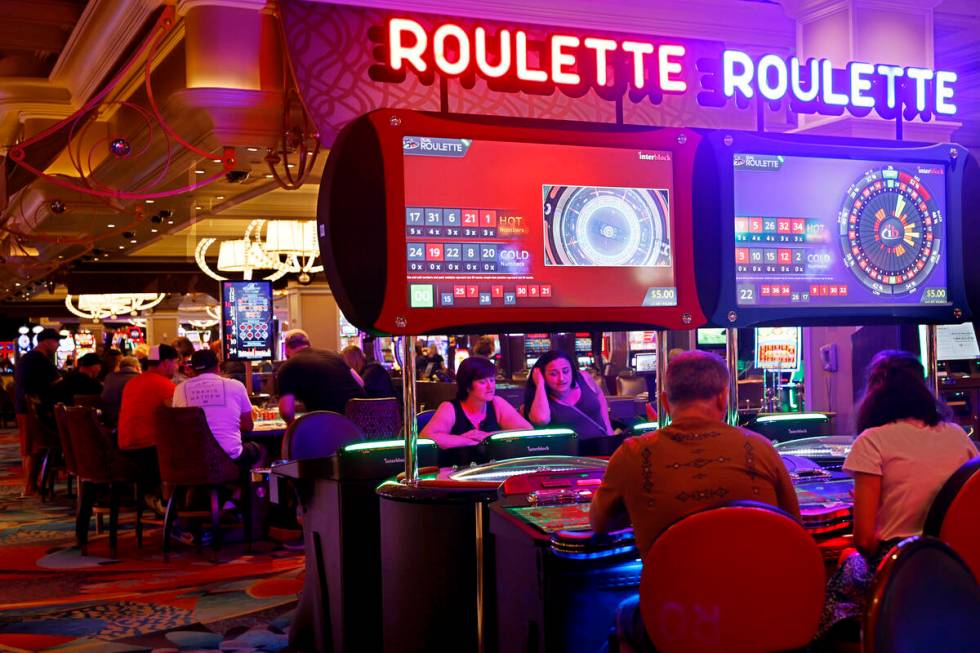Why Strip casinos continue to add these table games

Electronic table games have been in casinos around the world for more than two decades, but post-pandemic factors have made the games ubiquitous — and more diverse — in the Las Vegas market.
Tom Mikulich, senior vice president of innovation and slots for locals operator Station Casinos, said the company has had electronic table games for about a decade starting with IGT’s Dynasty product line. The commonly deployed automated games, like one roulette wheel spinning in the center, allowed players to sit at six to eight terminals with an outcome based on a random number generator.
But expanding product lines — such as terminals that offered one person one outcome and stadium-style setups with a live dealer staged for dozens of players — grew more popular as regulators welcomed the social distancing-friendly approach.
“It made live-dealer stations more visible along the Las Vegas Strip and then the locals market,” Mikulich said.
Las Vegas market research going back to 2019 found the machines were in about two-thirds of casinos, according to research from the industry research firm Eilers and Krejcik Gaming. Now the rate is in the high-80s. On the Strip, it’s 100 percent.
Brendan Moore, director of slot performance and analytics at Eilers and Krejcik Gaming, said pre-pandemic, ETGs made up about 1 percent of slot machines in the Las Vegas market. Recent data shows it has stabilized at roughly 2.5 percent, he said — about 0.5 percentage points above the national average.
The games offer economic value to the casinos because they off set low-valued tables, he said. Many Vegas casinos have phased out $5 and $10 minimum bets at live tables as electronic table games can offer that without the hourly cost of a dealer — or three at a craps table.
“You see those seldom now and the reason is you have these automated devices for the lower-value players,” Moore said, adding that the average bet is $15 a hand. Higher-rated players are more likely to choose a live table.
Operators and gaming manufacturers also see the growth as a way to attract different customers. New players find the games more approachable, Mikulich said.
“They’re a little bit less intimidating, one, and two, you can learn the game at your own pace,” he said.
In the near term, nationwide interest seems to have stabilized at about 2 percent of all licensed slot games, Moore said. Some casinos are even scaling back their full stadiums — defined by the firm as 18 units or higher — to mini-stadiums that have live-dealer flexibility for peak hours.
As Nevada casinos settle the right balance of games on their floor, manufacturers continue to develop the segment — and try to grow it out of the shadow of slot machines.
John Connelly, CEO of Las Vegas-based ETG developer Interblock, said its newest and fastest-growing product umbrella, “the smart pit,” is an example of how the segment is changing. The dual baccarat, dual roulette wheel, live craps and live blackjack tables have one dealer and multiple machine terminals at each table. Live craps allows players to shoot the dice at a table run by one dealer while rows of players at chipless, touch screen terminals several feet away play along.
The company is investing in automated table game growth. It acquired competitor Aruze Gaming America in July 2023 after it filed for chapter 11 bankruptcy protection five months earlier. Connelly said future innovations could come in the form of game variations and by finding ways to connect online players to traditional gaming.
“Different demographics are requiring different distribution methods of content,” Connelly said. “All we’re doing at Interblock now is we’re expanding the way we distribute our products using technology and innovation.”
McKenna Ross is a corps member with Report for America, a national service program that places journalists into local newsrooms. Contact her at mross@reviewjournal.com. Follow @mckenna_ross_ on X.